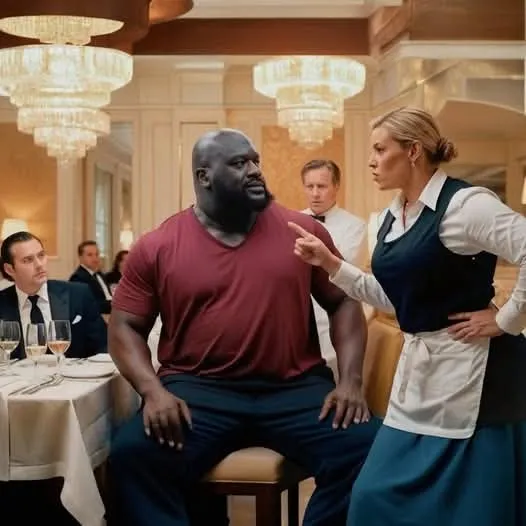Shaquille O’Neal didn’t walk into La Lumiere the way most of its wealthy patrons did. He arrived in a gray t-shirt and sweatpants, towering casually over the Beverly Hills crowd as chandeliers sparkled and tuxedos filled the room. But the moment he stepped inside, the staff froze — especially Emma, a server who judged every guest by their outfit before she ever judged their character. She looked Shaq up and down and asked, with a sneer loud enough for nearby diners to hear, if he was “sure he could afford to eat there.” Instead of snapping back, Shaq simply asked for a table, his calm demeanor exposing the ugliness of her assumptions more effectively than any argument could.
She seated him in the worst spot in the restaurant and made a show of reciting the menu prices, hoping she could embarrass him into leaving. But Shaq remained unbothered, ordering the restaurant’s most expensive dish without blinking. Meanwhile, diners around him began to whisper in shock — not at his outfit, but at her cruelty. A businesswoman nearby shook her head. An older couple exchanged uneasy glances. The room slowly shifted from amusement to discomfort as people realized they were watching a man being belittled because he chose comfort over couture. And the more Shaq stayed steady, the more Emma’s mask of superiority cracked.
When the meal arrived, Shaq applauded the jazz band, thanked the busboy, and treated every staff member — except Emma — with warmth that made her rudeness stand out even more sharply. Patrons started quietly supporting him: a nod here, a smile there, small gestures acknowledging his grace in the face of condescension. Emma, flustered by her inability to get a rise out of him, doubled down with snide comments that only deepened the room’s sympathy for Shaq. By the time he paid his bill, tipping generously despite the treatment, the restaurant had transformed — diners weren’t admiring chandeliers anymore; they were watching a masterclass in dignity from a man who refused to let arrogance touch him.
When Shaquille finally stood to leave, La Lumiere felt different. Patrons who’d watched the entire ordeal were left questioning their own assumptions about wealth, appearance, and respect. Emma, meanwhile, had been exposed — not because Shaq humiliated her, but because she humiliated herself. Shaquille didn’t come to teach a lesson, yet he left one behind: true class isn’t measured by clothes, menus, or Michelin stars. It’s measured by how you treat people when no one is watching… and especially when everyone is. That night, Shaq didn’t just walk out of La Lumiere as a celebrity — he walked out as the quiet reminder that humanity will always matter more than status.
